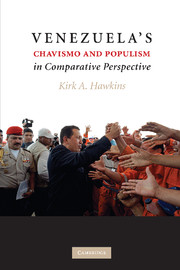Book contents
- Frontmatter
- Contents
- List of Tables
- Preface
- Acknowledgments
- 1 Introduction
- 2 Chavismo, Populism, and Democracy
- 3 Measuring the Populist Discourse of Chavismo
- 4 Party System Breakdown and the Rise of Chavismo
- 5 The Causes of Populism in Comparative Perspective
- 6 Populist Organization: The Bolivarian Circles in Venezuela
- 7 Populist Policy: The Missions of the Chávez Government
- 8 Conclusion
- Appendix A The Populist Speech Rubric
- Appendix B Test of the Sampling Technique
- Appendix C Test of Interaction Effects
- References
- Index
6 - Populist Organization: The Bolivarian Circles in Venezuela
Published online by Cambridge University Press: 17 May 2010
- Frontmatter
- Contents
- List of Tables
- Preface
- Acknowledgments
- 1 Introduction
- 2 Chavismo, Populism, and Democracy
- 3 Measuring the Populist Discourse of Chavismo
- 4 Party System Breakdown and the Rise of Chavismo
- 5 The Causes of Populism in Comparative Perspective
- 6 Populist Organization: The Bolivarian Circles in Venezuela
- 7 Populist Policy: The Missions of the Chávez Government
- 8 Conclusion
- Appendix A The Populist Speech Rubric
- Appendix B Test of the Sampling Technique
- Appendix C Test of Interaction Effects
- References
- Index
Summary
By and for the fatherland, and with President Chávez.
Slogan of the Bolivarian CirclesThe previous chapters demonstrate that populism understood as discourse or worldview is a distinct phenomenon that we can identify in the case of Chavismo, and that Chavismo and other successful populist movements arise as responses to crises of legitimacy rooted in the weak rule of law. In the next two chapters I begin to address a final, related question that asks what the consequences of populism are. That is, do politicians and citizens expressing a populist discourse also engage in unique forms of behavior that we can clearly trace to their fundamental beliefs? I attempt to answer this question here by exploring the effects of populism on political organization through a study of the Bolivarian Circles in Venezuela. In the next chapter, I move on to explore the effects of populist ideas on public policy.
This chapter and the one that follows provide valuable opportunities to show how ideas have important consequences for real political phenomena. They demonstrate that we cannot reduce basic decisions about political organization and government policy merely to the material self-interest or office maximization of politicians. However, these chapters also allow us to revisit some of the basic conceptual questions about populism and show how some of the better-known alternative definitions are encapsulated by the discursive one. Here I consider the political-institutional definition. Organizational attributes form a prominent part of this new approach to populism, which sees features such as low institutionalization, support from large numbers of voters, and low levels of organization as the primary attributes of populism.
- Type
- Chapter
- Information
- Venezuela's Chavismo and Populism in Comparative Perspective , pp. 166 - 194Publisher: Cambridge University PressPrint publication year: 2010

